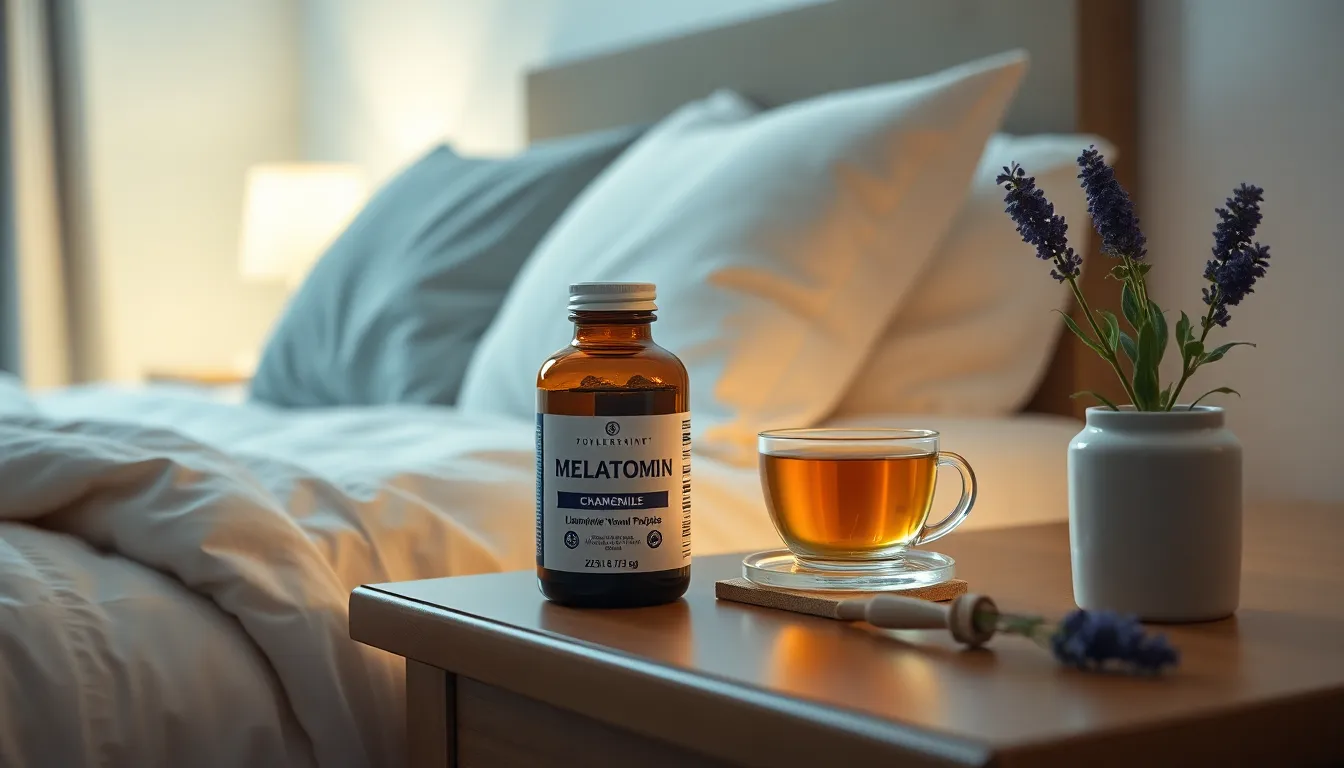In today’s fast-paced world, sleep often takes a backseat, leaving many searching for effective solutions. Sleep aids have emerged as a popular choice for those struggling with insomnia or restless nights. From natural remedies to over-the-counter options, these aids promise to help individuals reclaim their much-needed rest.
Understanding the different types of sleep aids and how they work can empower people to make informed decisions. Whether it’s herbal supplements, prescription medications, or lifestyle changes, finding the right approach can significantly enhance sleep quality. In this article, we’ll explore various sleep aids, their benefits, and potential drawbacks, guiding readers toward a more restful night.
Table of Contents
ToggleOverview of Sleep Aids
Sleep aids assist individuals in achieving better sleep quality, addressing issues like insomnia and disrupted sleep patterns. These aids fall into three primary categories: natural remedies, over-the-counter options, and prescription medications.
Natural Remedies
Natural remedies include herbs and supplements. Common examples consist of melatonin, valerian root, and chamomile. These substances often promote relaxation and support the body’s sleep-wake cycle without causing significant side effects.
Over-the-Counter Options
Over-the-counter sleep aids typically feature antihistamines, such as diphenhydramine and doxylamine. These medications encourage drowsiness and can assist in falling asleep. Users should note, however, that these options may lead to grogginess upon waking.
Prescription Medications
Prescription medications, like benzodiazepines and non-benzodiazepine sleep aids, target severe sleep disturbances. Examples include temazepam and zolpidem. While effective, these medications may lead to dependency and should be used under medical supervision.
Potential Drawbacks
Potential drawbacks exist for all sleep aids. They may cause side effects, including daytime drowsiness, cognitive impairment, or disruptions in sleep architecture. Consulting a healthcare professional before starting any sleep aid ensures the most suitable option based on individual needs.
Conclusion on Usage
Sleep aids can play a role in improving sleep quality. However, understanding their types and potential impacts is crucial for informed decisions, ultimately leading to better rest.
Types of Sleep Aids

Various sleep aids exist to help individuals achieve better rest. These aids include prescription medications, over-the-counter options, and natural remedies.
Prescription Medications
Prescription medications often address severe sleep disturbances. Common examples include benzodiazepines, such as alprazolam, or non-benzodiazepine sleep medications, like zolpidem. These drugs effectively promote sleep onset and duration. However, their long-term use may lead to dependency. Regular consultation with a healthcare professional ensures appropriate use and monitoring for potential side effects, including dizziness and cognitive impairment.
Over-the-Counter Options
Over-the-counter (OTC) options typically include antihistamines, such as diphenhydramine and doxylamine. These medications induce drowsiness and offer a mild sedative effect. While OTC sleep aids can provide short-term relief, users often experience morning grogginess and reduced alertness. It’s crucial to limit usage and consult a healthcare professional if sleep issues persist.
Natural Remedies
Natural remedies present an alternative for those seeking non-pharmaceutical solutions. Melatonin supplements regulate sleep-wake cycles while valerian root promotes relaxation and reduces sleep latency. Other options include chamomile tea or lavender aromatherapy. While these remedies tend to exhibit fewer side effects, their efficacy varies among individuals. Consulting a healthcare professional remains beneficial to tailor the approach to personal needs and conditions.
Effectiveness of Sleep Aids
Sleep aids can provide significant relief to individuals facing sleep disturbances. Their effectiveness varies based on the type and individual response.
Short-Term Benefits
Sleep aids offer immediate relief for short-term insomnia. Over-the-counter options often induce drowsiness within 30 to 60 minutes, enhancing sleep onset. Prescription medications work similarly, providing fast-acting solutions for those needing urgent assistance. Natural remedies, such as melatonin supplements, support sleep cycle regulation, showing benefits within days of use. Many users report improved sleep quality, increased duration, and fewer awakenings, contributing to better daytime functioning.
Long-Term Implications
Long-term use of sleep aids raises concerns about dependency and tolerance. Prescription medications, especially benzodiazepines, may lead to increased tolerance, requiring higher doses for the same effect. Non-benzodiazepines, while less addictive, can still pose risks if used over extended periods. Natural remedies, although generally safer, may cause side effects like dizziness and grogginess if misused. Regular consultation with healthcare professionals is essential for monitoring potential cognitive impairment and other health issues. Users must weigh the benefits against risks, emphasizing the importance of exploring alternative sleep strategies alongside pharmacological aids.
Safety and Side Effects
Sleep aids provide relief for many, but they also come with potential side effects and risks. Understanding these aspects helps individuals make informed choices about their sleep health.
Common Side Effects
Common side effects of sleep aids vary by type and individual response. Many over-the-counter sleep aids, particularly those containing antihistamines, can cause:
- Drowsiness: Prolonged drowsiness may persist into the next day.
- Dry Mouth: This may lead to discomfort or difficulty swallowing.
- Headache: Some users report headaches upon waking.
- Dizziness: Users may experience dizziness, increasing the risk of falls.
Natural remedies like melatonin typically show fewer side effects but can still cause mild headaches or daytime drowsiness in some individuals. Prescription sleep medications, such as benzodiazepines, often lead to more significant side effects, including cognitive impairment and memory issues, particularly with long-term use.
Risks of Dependency
Dependency poses a serious risk with prolonged use of certain sleep aids. Prescription medications, especially benzodiazepines and some non-benzodiazepine agents, may lead to both psychological and physical dependency. The risks include:
- Tolerance: Over time, users may require higher doses to achieve the same sleep-inducing effect.
- Withdrawal Symptoms: Stopping these medications abruptly can cause withdrawal symptoms, including anxiety, insomnia, and irritability.
- Rebound Insomnia: After discontinuation, insomnia may worsen temporarily, leading users to return to the medication.
It’s important for individuals to use these aids only under the guidance of a healthcare professional to minimize risks and explore alternative, non-pharmaceutical sleep strategies as necessary.
Conclusion
Navigating the world of sleep aids requires careful consideration and awareness of individual needs. While various options exist to address sleep disturbances, it’s crucial to recognize the potential risks and side effects associated with each type. Natural remedies may provide gentle support without significant drawbacks, while over-the-counter and prescription medications can offer immediate relief but come with the possibility of dependency.
Prioritizing consultation with healthcare professionals can ensure that users select the most appropriate aid for their situation. By balancing the use of sleep aids with alternative strategies for improving sleep hygiene, individuals can work towards achieving better sleep quality and overall well-being.




